We’re pleased to bring you the last in a series of candid, in-depth interviews with this year’s Sirens Guests of Honor. We’ll cover a variety of topics relevant to Sirens with each author, from their inspirations, influences, and craft, to the role of women in fantasy literature as befits our 2016 focus on lovers and the role of love, intimacy, and sex. We hope these conversations will be a prelude to the ones our attendees will be having in Denver this October. Today, Andrea Horbinski interviews Laurie J. Marks.
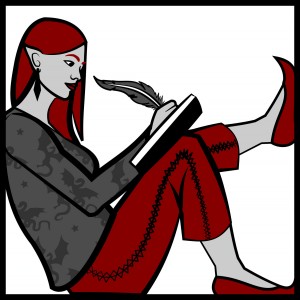
ANDREA: The theme of Sirens this year is lovers, but what struck me about the world of the Elemental Logic books is not so much the Shaftali acceptance of queerness (which: yay!) as the expansive definition of family. In particular, I loved the family that the protagonists of Fire Logic have forged by the time that Earth Logic begins. Was there a particular inspiration or plan behind the way you laid out Shaftali family and gender relations, or did they come to you naturally while you were writing the books?
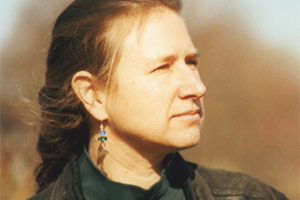 LAURIE: Let me first explain how families work in Shaftal. Large, multi-generational families are the norm there, and nuclear families would be frowned upon, because Shaftali believe that children need many parents. Typically, a young person marries into a pre-existing family and has children with several partners who may or may not also be members of that family, although families also include pairs of monogamous lovers. The children are raised by the entire family regardless of biological relationship, though children are likely to have a special relationship with biological mothers and fathers. People who belong to an elemental order don’t belong to families, but they do treat each other as family members; and although they might have children, they don’t raise or even know those children.
LAURIE: Let me first explain how families work in Shaftal. Large, multi-generational families are the norm there, and nuclear families would be frowned upon, because Shaftali believe that children need many parents. Typically, a young person marries into a pre-existing family and has children with several partners who may or may not also be members of that family, although families also include pairs of monogamous lovers. The children are raised by the entire family regardless of biological relationship, though children are likely to have a special relationship with biological mothers and fathers. People who belong to an elemental order don’t belong to families, but they do treat each other as family members; and although they might have children, they don’t raise or even know those children.
In our real world, a lot of people surround themselves by intimates of one kind or another that substitute for a family they don’t want or that doesn’t want them, and I was trying to model the Shaftali families after those extended friendships and cooperative relationships. Also, I wanted to experiment with a world in which the concepts of heterosexuality (or homosexuality) and gender roles simply don’t exist. Lacking those concepts, it seems like people would not pair off into nuclear families, and instead would group together into practical, multi-generational alliances to operate a farm or business. Because these farm or businesses survive for hundreds of years, these families provide a lot of long-term stability, yet within that stability there’s a lot of room for individuals to have all different kinds of loving relationships, and for those relationships to shift and change over time. Also, in this world, the idea of family is quite flexible as well: for example, the central family in the Elemental Logic series is peculiar, because it formed spontaneously and is crazily diverse: three of its members simultaneously are in orders and nearly all of them have elemental talents; six of its members are in monogamous pairings, and its members come from four different ethnic groups and speak three different languages. Yet it is still considered to be a family because the adults live together, are raising a child together, and share a common enterprise.
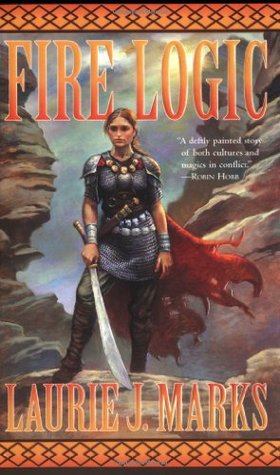 ANDREA: Colonialism and warfare are major themes in the world of Shaftal, and in particular, the revelation at the end of Water Logic about the origins of the Shaftalese casts the previous events of the series in a very different light. Similarly, forgiveness and reconciliation and negotiation are explicitly issues that the characters struggle with and work towards. The latter set of ideas is not often paired with the former in fantasy works. How do you see the relationship between them, either in the Elemental Logics books or more generally?
ANDREA: Colonialism and warfare are major themes in the world of Shaftal, and in particular, the revelation at the end of Water Logic about the origins of the Shaftalese casts the previous events of the series in a very different light. Similarly, forgiveness and reconciliation and negotiation are explicitly issues that the characters struggle with and work towards. The latter set of ideas is not often paired with the former in fantasy works. How do you see the relationship between them, either in the Elemental Logics books or more generally?
LAURIE: In classic fantasy—like the works of Tolkein and C.S. Lewis—warfare was about the battle of good and evil. Certainly, both of those authors were influenced by the ancient belief that wars are won by the righteous. But during my formative years of the sixties, people became opposed to, or at least skeptical of, the idea that war could be just. From then on, I saw a lot of evidence that even in a war that could be said to be justified, the negative effect on the individuals who fought in those wars was profound, and the long-term ability of war to solve problems or even to prevent further warfare was questionable. But I don’t want to give you the idea that my books offer a realistic solution to the problems of warfare and colonialism! In fact, I’m mainly focused on stories about people who are trying to end war and violence, or who become convinced to abandon fighting. But, I’m afraid that when I talk about the books in this way, it makes them sound rather self-righteous and tedious, and they’re not. I work very hard to write exciting, fast-moving stories that have interesting and engaging characters. The ideas operate almost entirely in the background.
I worked on these books over a long time period (more than twenty years), if you look closely you’ll see that my treatment of these themes evolves from book to book. I started off thinking about how fighting for a cause, even a just cause, can turn the fighters into the thing they’re opposed to, and that idea arose from my mix of sympathy for and horror of the guerilla movements that were then prevalent in the world. By the time I was working on the second book, Earth Logic, I had started to suspect that all of humankind’s problems stem from our need to believe that our own values and belief systems are true. Nowadays, I’m thinking more and more about the importance of humility, which shows up much more in the last two books of the series.
In the Elemental Logic series, you see that war and violence can’t be ended without a radical change in values. This is something of a queer perspective, because queer people are born into a world that assumes people are heterosexual and that biological sex and gender are the same thing; then they have to undergo a complete reorientation—a woman realizes she’s actually a man, or that she has fallen in love with a female friend, or, as actually happened to me, same-sex characters in a book I was writing insisted on making love with each other. But this loss and transformation of world view also happen in non-sexual ways, such as when a person ceases to believe in God, or in communism. You see these shifts in world-view throughout the Elemental Logic series. For example, Fire Logic seems to begin with a fairly typical good-versus-evil type of conflict, until Zanja realizes that her allies aren’t any better than her enemies. In Earth Logic, one point-of-view character is a kind and principled human being, despite being a bad guy. In Water Logic, there’s an origin story that reveals how connected the good guys and the bad guys are. And in Air Logic, a subgroup of the good guys are the story’s antagonists. So I guess I’m suggesting that in order for forgiveness, reconciliation and negotiation to happen, everyone has to acknowledge how arbitrary and plastic our beliefs and ways of thinking are. For peace to follow war, it’s not merely necessary for some people to be generous and let go of their anger. Instead, everybody has to take seriously the idea that nobody is right. That’s where the humility comes in. This certainly is an atypical way to deal with good and evil in a fantasy novel. I seem to be writing sword-and-sorcery for pacifists.
ANDREA: The ideas of elemental logics, and that “the way you do anything is the way you do everything,” are some of the things I love most about the series, but they’ve also given me some of the more challenging reads of my life. In particular, since I am exactly half air and half fire, I really struggled with reading and understanding Water Logic. (Earth Logic was easier, because by earth logic, action is understanding, so reading the book led me to understand it on some level.) How has your own viewpoint helped or hindered you writing the books and the characters, as they each have their own distinctive ways of being?
LAURIE: I definitely ran into my own limitations while writing Water Logic. If I were Shaftali, I wouldn’t have even a drop of water in my elemental make-up, and as a result, in Water Logic there aren’t any point-of-view characters who are much influenced by the water element. Water logic is so alien to me that I just couldn’t imagine the subjective experience of a water elemental. The story is about the overlapping of past, present and future, because that was one aspect of water logic I could get a handle on, whereas I simply couldn’t write or even imagine a novel that worked like weather or like a piece of music. Also, throughout the series I found that depicting characters who are influenced by air can be a lot of work. It was easy to portray them as bad guys, because they can be so rigid and controlling, but depicting them as valuable and necessary took some imaginative effort. Fortunately, I do value some characteristics of air, such as order and consistency, even though I don’t have a lot of those things in my life, and I admire people who have insight into how or why other people think in particular ways. I could use those values to help me to round out the characters of the air elementals, particularly Norina Truthken, who is a central character throughout the series. I found it easier to write about people who are influenced by fire or by earth, because those are the types I most understand and want to be like, but I have to be careful not to idealize them, or they stop being interesting.
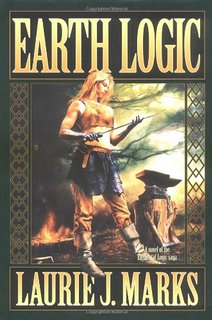 ANDREA: Community and negotiation play important roles in your books, which seems somewhat remarkable in a genre that often defaults to stories about heroic individuals and Chosen Ones. To me, these elements (ha) feel very realistic; I think we’ve all encountered people like the farmers so stubborn the only way to deal with them was to magic their dogs. What seems unusual is the way these aspects of Shaftal often power the plot of the books. What was your thinking in making those choices, structurally or philosophically?
ANDREA: Community and negotiation play important roles in your books, which seems somewhat remarkable in a genre that often defaults to stories about heroic individuals and Chosen Ones. To me, these elements (ha) feel very realistic; I think we’ve all encountered people like the farmers so stubborn the only way to deal with them was to magic their dogs. What seems unusual is the way these aspects of Shaftal often power the plot of the books. What was your thinking in making those choices, structurally or philosophically?
LAURIE: Someone once referred to the Elemental Logic series as utopian, and I was rather surprised to realize that I do seem to be depicting an ideal world that’s grounded in a philosophy. But, honestly, childish wish-fulfilment also plays a large role in my writing decisions. Nevertheless, let’s talk about the philosophy. In the same way that the lone hero type of fantasy really is a masculine story, it seems feminist to emphasize the importance of an entire community in accomplishing anything worth doing. In traditional sword and sorcery type fantasy, the story ends when the war is won, but in the Elemental Logic series, the characters engage in an effort first to convince everyone that war is only making matters worse, and then to employ the values that already exist in the culture to make sure it doesn’t flare up again. So rather than using the power of violence and dominance, it’s using the resources of community self-interest along with food and shelter, meaning, love, children, and hope, to convince everyone to lay down their weapons and start doing productive work again.
Besides this feminist take on war, there are a lot of other (rather random and ill-considered) philosophies behind my emphasis on community and negotiation. Although Shaftal isn’t purely nonhierarchical, it does rely on a consensus process, and there really isn’t much of a social mechanism by which any one individual can acquire political power, or gain control of resources, or exercise control over others. That social system seems like it would work well so long as there aren’t any problems, but I’ve also given them one person whose job it is to intervene when problems crop up. That’s how the recalcitrant farmers end up being herded by their own dogs—they wouldn’t behave responsibly, so they were forced to do so. Also, Shaftal has a kind of meritocracy, except that people with a lot of talent are expected to spend their lives in service. The people they help give them food and shelter, but they don’t pay them, so there’s no way for them to become rich or self-important. The ideals of the Shaftali people are communitarian, they value long-range thinking, and there’s a lot of traditional small town values, like helping neighbors, feeding strangers, and doing their share of the work. It seems like the ways that problems are solved has to be logically consistent with that culture as I’ve described it. A Shaftali way to eliminate the enemy would be to treat them as they treat anyone else—to marry them, for example, or at least to feed them. Of course, it’s not every family that could be convinced to marry an enemy soldier, but it is culturally feasible.
ANDREA: I’ve read that there is at least one complete draft of Air Logic in the wild, because Rosemary Kirstein has blogged about reading it. Can you tell us what the status of Air Logic is, and what’s next for you besides that?
LAURIE: I had a pretty awful few years during which I simply couldn’t write very much. A couple of years ago, I thought Air Logic was finished. But it turns out I was wrong, and now I’m revising it again. I’m glad that I’m doing it, because I’m discovering a lot of places that I seem weirdly disengaged from my own story. Revising Air Logic has made me realize how much I was damaged—not just emotionally, but because I didn’t have the energy to maintain my friendships and connections, and so I ended up writing in a vacuum. Anyway, while I finish Air Logic, I have another book on the back burner. It’s called Cunning Men, it’s about a peculiar friendship, and I’m about halfway done with the first draft.
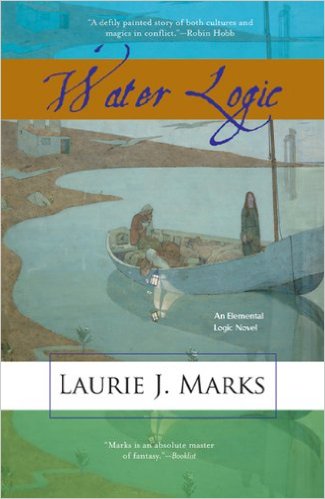 ANDREA: Lastly, please tell us about a remarkable woman of fantasy literature—an author, reader, agent, editor, scholar, or someone else—who has changed your life.
ANDREA: Lastly, please tell us about a remarkable woman of fantasy literature—an author, reader, agent, editor, scholar, or someone else—who has changed your life.
LAURIE: If you don’t mind, I’d like to tell you about a group rather than an individual. For over ten years, I met more or less monthly with three other women novelists: Rosemary R. Kirstein, Delia Sherman, and Didi Stewart. They served as role models, teachers, healers, advisors, problem-solvers, and, above all, as friends to whatever book I was writing. Delia has an extraordinary gift for understanding what I was doing in my work—far better than I understood it myself—and she is one of the most delightful and literary fantasy authors around, a recipient of several much-deserved awards. Rosemary has a powerful rational mind, and happily grappled with my plotting problems and anything else that perplexed me. Rosemary is the author of a science fiction series that is based in an adage expressed by Arthur C. Clarke (among others), that “Any sufficiently advanced technology is indistinguishable from magic.” Didi, a versatile vocalist and musician, is a thoughtful and pragmatic critic whose insights kept bringing me back to awareness of what my readers needed so that a story would work for them. She has written several unpublished novels that I wish were in print. Those three friends were essential to my growth as a writer, and I’m profoundly happy that after a long hiatus we have started meeting again, despite the fact that we now live in three different states.
Laurie J. Marks’s Elemental Logic series is set in the world of Shaftal. The elements of fire, earth, water, and air have sustained the peaceful people of Shaftal for generations, but Shaftal has been overrun, and the ancient logic of the land is being replaced by the logic of hatred. Laurie’s novel Fire Logic, the first in the series, won the Gaylactic Spectrum Award for best novel in 2003, and Earth Logic, the second in the series, won the same award in 2005. The third in the series, Water Logic, was included on the honor list for the James Tiptree, Jr. Award in 2007, and the final book, Air Logic, is currently a work in progress. Laurie’s other works include Dancing Jack, about a girl who is trying in vain to forget a past filled with bloodshed and rebellion, and was short-listed for the James Tiptree, Jr. Award in 1993; The Watcher’s Mask, about a two-souled person on a journey of self-awareness that will lead her to discover the true nature of her race; and The Children of the Triad series (Delan the Mislaid, The Moonbane Mage, and Ara’s Field), where the Walkers ruled the land, the Aeyrie soared the skies, and the Mer reigned over the seas. Laurie currently teaches writing at the University of Massachusetts, Boston.
For more information about Laurie, please visit Laurie’s website.








Pingback: Around the internet: Interview, roundtable, write-up | Andrea Horbinski